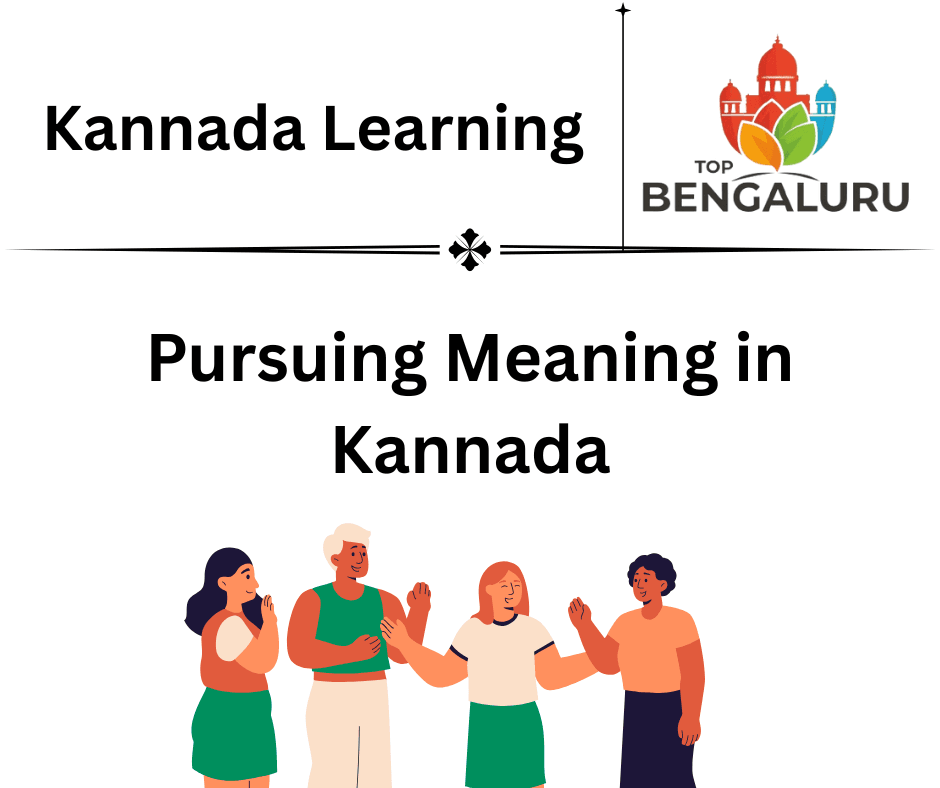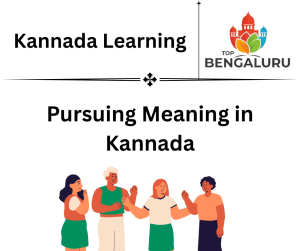
Pursuing Meaning in Kannada
Pursuing Meaning in Kannada: A Cultural and Linguistic Guide
The Kannada language, with its rich heritage and poetic depth, offers more than just grammar and vocabulary. It carries a way of thinking, feeling, and connecting. If you’re interested in pursuing meaning in Kannada, you’re not just learning a language—you’re diving into a culture.
Whether you’re new to Kannada or have roots in Karnataka, understanding how meaning is shaped in the language can enhance your appreciation of local expressions, literature, and conversation.
In this guide, we’ll explore the nuances of meaning in Kannada, share practical tips for learners, and help you tap into authentic resources to learn Kannada for free.

Why Pursuing Meaning in Kannada Matters
Language is more than translation—it’s about understanding context. In Kannada, a word’s meaning often depends on tone, situation, and cultural backdrop.
For example:
“Santosha” means happiness, but it’s often used to express contentment, a deeper, quieter joy.
“Beku” means “want,” yet how it’s said can signal need, desire, or even urgency.
Deepening Human Connection Through Kannada
Pursuing meaning in Kannada helps you:
Communicate more respectfully in daily interactions
Understand subtle emotions in Kannada cinema and literature
Avoid misunderstandings while speaking or interpreting
How to Start Pursuing Meaning in Kannada
Here are proven strategies for mastering Kannada meaningfully:
1. Learn with Real-life Contexts
Textbooks teach grammar—but Kannada meaning lives in streets, songs, and stories.
Try this:
Watch Kannada news or serials with subtitles
Read children’s books for simple sentence structures
Talk to native speakers, even if it’s just greetings
📚 Recommended Resource: TopBengaluru Kannada Learning – Learn Kannada for free with structured lessons and everyday phrases.
2. Focus on Common Kannada Words with Multiple Meanings
Many Kannada words have layers of meaning depending on usage. Some examples:
“Banni” – Come (used politely, casually, or commandingly)
“Hoditu” – It hit / It’s broken / It worked (depending on context)
Understanding these nuances deepens your fluency and confidence.
Cultural Dimensions of Meaning in Kannada
Respect and Hierarchy
Kannada culture is deeply respectful. The way you say “you” can reflect your relationship with the listener:
“Neenu” – Informal “you”
“Neeru” – Polite/respectful “you”
Using the wrong form can unintentionally sound rude. That’s why pursuing meaning in Kannada involves understanding social dynamics too.
Proverbs and Idioms: Wisdom in Every Phrase
Kannada proverbs are packed with meaning. For example:
“Halli hudugi, halli buddhi”
(A village girl, village thinking) – Often used to describe someone with narrow views.
Learning such expressions reveals the values and humor of the Kannada-speaking world.
FAQ: Pursuing Meaning in Kannada
Q1: Is it hard to understand meaning in Kannada if I know Hindi or English?
A: Not necessarily. While Kannada has a Dravidian root, many expressions align with Indian cultural concepts. It’s about patience and context-building.
Q2: Can I pursue Kannada meaning without learning to write it?
A: Absolutely. Spoken Kannada helps you grasp meaning through tone and flow. Writing helps later but isn’t a barrier.
Q3: Where can I find free Kannada learning resources?
A: TopBengaluru Kannada Learning offers free guides, audio support, and cultural lessons.
Key Benefits of Learning Kannada Meaningfully
Speak with Confidence: Understand what to say and when
Navigate Local Life: Whether in Bengaluru or Mysuru, knowing the right words matters
Enjoy Kannada Media: Songs, films, and books become more enjoyable
Strengthen Cultural Bonds: Language builds trust in every relationship
Quick Tips to Deepen Kannada Understanding
Practice daily with native speakers or apps
Break down new phrases word by word
Watch Kannada comedy—humor relies on subtle meaning
Repeat new words in sentences to fix their meaning
Ask locals about idioms you don’t understand
Final Thoughts: Kannada Is More Than Just Words
When you pursue meaning in Kannada, you’re not just learning a language—you’re embracing a way of life. Every word carries warmth, wisdom, and local flavor. The more you listen, observe, and engage, the more fluent and culturally connected you’ll become.
Ready to Learn Kannada for Free?
👉 Start your journey here: TopBengaluru Kannada Learning
With free lessons, practical guides, and audio support, it’s the best place to begin.

